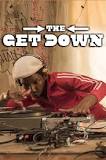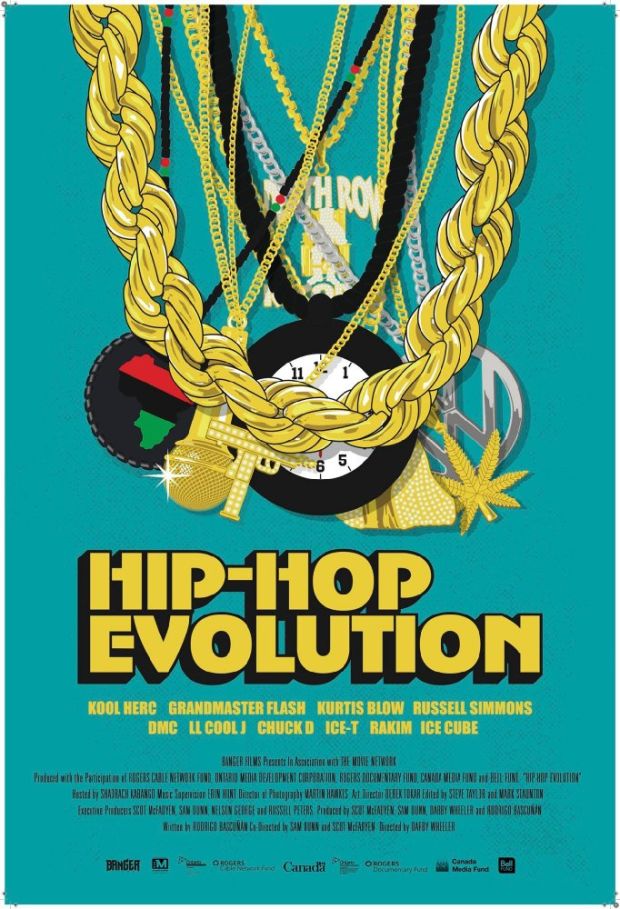Watching Netflix revealing 4-part documentary series Hip Hop Evolution a couple months after enjoying director Baz Luhrmann’s exceptionally entertaining 6-part historical drama The Get Down (also Netflix) was somewhat akin to watching FX’s riveting O.J. Simpson murder drama, followed in short order by ESPN’s brilliant and exhaustive O.J. Simpson: Made in America documentary. In both cases you had a finely-executed drama followed in short order by a documentary vehicle that gave you the real deal in a kind of hand-in-glove relationship (no O.J. pun intended!). The documentary film is affably and expertly narrated by its admirably-invested, attitude-free tour guide, the Canadian MC Shad, aka Shadrach Kabango. The fact that he’s Canadian perhaps forgives his youthful naiveté when one of the hip hop pioneers details the formative influence of the early rappin’ comic Pigmeat Markham, an African American community record collection staple in the ’60s and ’70s – in the rack right next to those hilariously blue Redd Foxx and Moms Mabley records our parents forbad us to listen to until we were “old enough” – though we damn sure devoured them when Mom & Dad weren’t home, or when we snuck outta bed to peep their house parties!

The Get Down dramatizes the times and landscape (principally the oft-neglected New York City borough of the Bronx) that gave rise to hip-hop, while The Evolution of Hip Hop, with the gritty mid-70s realities of life in the Bronx in vivid terms, provides even greater context to the people and the atmospheres that gave rise to the dominant force in 21st century pop music culture. The smooth transition from the dramatized version, with its greater emphasis on interpersonal relationships and familial backdrop, works beautifully juxtaposed alongside the documentary, which nails the facts and figures. The doc introduces the viewer to characters heretofore unknown, or otherwise underground (dig the interview with the brother who rapped his basement MC role alongside legendary house party DJ Kool Herc), which gave root to the form’s march through its ongoing, often controversial 40+ year evolution.
Kool Herc’s place in music history is sealed by both the documentary and his depiction in The Get Down, as are such early turntable doctors as Grandmaster Flash. The documentary series provides excellent context for the oft-overlooked importance of sound system technology (particularly turntables) in the development of hip hop. The section of Grandmaster Flash’s interview where he details his childhood fascination with electronic gadgets and circular motion (from the spin of a clothes dryer window, to spinning bicycle wheels, to his dad spinning discs at home), is priceless, including the ‘ah-ha’ moment when he discovers how to separate the break beats he sought to emphasize from the rest of the Lp; and these guys most definitely focused on the long-form of the Lp, as opposed to the singles or 45s preceding generations partied to. The documentary firmly establishes the fact that it was the DJs and MCs who were as important – some might argue more important – to the development of hip hop as the rappers themselves, whose historical importance has been somewhat inflated by human nature’s broader embrace of the human voice over the instrumental and technological influences and innovations in music.
Another fascinating segment of the documentary series comes when hip hop scenester (he was first to bring the form to broadcast television via Yo MTV Raps) Fab 5 Freddy (interviewed in these pages in two parts: : http://www.openskyjazz.com/2011/05/jazz-influence-t…roots-of-hip-hop/ http://www.openskyjazz.com/2011/05/pt-fab-5-freddy-…roots-of-hip-hop/ ) recalls introducing hip hop pioneer DJ Afrika Bambaataa to downtown visual artist Keith Haring and how Haring hatched the idea of inviting Bambaataa downtown from the Bronx to DJ parties, which began to broaden the reach of this burgeoning form, encouraging the immersion of young white kids. Thus introducing Debbie Harry‘s pivotal embrace of early rap, at a time when progressives hungered to loosen disco’s grip on club and dance culture.

The documentary segment detailing how Sugarhill Gang came to record the earliest hip hop hit, “Rapper’s Delight” is one of the film’s touchstones. Tellingly some of the early OG’s of the form patently dismissed the mass popularity of “Rapper’s Delight” in the same manner hardcore jazzers dismissed the smooth jazz heyday of the 1990s. Sugarhill Gang was viewed by hip hop’s early hardcore as largely flukey perpetrators, the group having been birthed by R&B record executive Sylvia Robinson. Jazz historians might easily analogize Sugar Hill Gang as The Original Dixieland Jazz Band of hip hop. ODJB made history’s first jazz record in 1917 largely because black musicians, as legend has it like trumpeter Freddie Keppard, who turned down the opportunity. And why’d he decline overtures to make that first jazz record? Because they thought someone might steal their licks! The same was apparently true of early hip hop proponents who missed the same boat Sugarhill Gang seized, supervised by Sylvia Robinson. And the series does indeed make that analogy with early black jazzers, via the distinguished black pop writer Nelson George.
Perhaps owed to its production by an otherwise laudable Canadian firm the only even slight bobble in The Evolution of Hip Hop is the total absence of one important historical factoid that helped compel the birth of hip hop. Historical footage in the documentary shows Ronald Reagan’s now-infamous foray into the Bronx, back when the borough was truly “burning”. What was missed was the impact his draconian economic policy known as Reaganomics had on the subsequent Reagan years (1980s) development of hip hop. Jazz grandmaster Max Roach, was a keen observer of hip hop’s early development, principally through conversations with his godson Freddy Brathwaite, known as Fab 5 Freddy. Max often spoke of Reaganomics’ drastic cuts to public education being at the root of hip hop’s development.
With those cuts in public education funding, among the first thing administrators slashed was public school music education. This observer came along at a time when all you had to do is choose which instrument you wanted to play if you desired to learn music; every school had its share of old instruments ready to be resurrected from whatever closet they were kept at school. Those Reaganomic cuts, and in most cases outright elimination, of public school music education, didn’t dampen kids’ desire to somehow make music; so instead they chose turntable technology and wordsmithing.
But ultimately that was a small overlook on the part of this otherwise excellent and highly-recommended Netflex documentary The Evolution of Hip Hop, a must-see no matter your interest in or position on the form. In its four parts the Evolution of Hip Hop takes the viewer geographically from the Bronx to South Central L.A. as its end point. Thankfully we are spared the many dollar-driven, two bit, narcissistic hip hop charlatans that have emerged in subsequent years. Ultimately, this report recommends ordering your viewing ala the O.J. saga – drama (The Get Down) first, followed by the reality check (The Evolution of Hip Hop).
